
Our RowErgs are backed by a limited 2-year and 5-year warranty. Find out more ›
If you purchase directly from us and are not satisfied with your RowErg for any reason, you may return it to us within 30 days of shipment and we will refund the cost of the machine.
There is not one muscle group neglected. Total choice workout...With the Dynamic Rower I finally get the workout I've always deserved but could never find. A lifetime fan here.
Anchorage, Alaska, United States
The Dynamic RowErg offers the closest simulation to rowing on the water and was developed to meet the specific training needs of the competitive rowing athlete. Unlike our static Concept2 RowErg, the footrest on the Dynamic is free to move and there’s minimal movement of body mass throughout the stroke. The Dynamic demands similar concentration and body control to that needed when rowing in a boat, making it an excellent sport-specific training and coaching tool. Using the Dynamic Link accessory it’s easy to join together two or more Dynamics, so you can train as a team boat.
If you’re looking to move faster on the water, the Dynamic is what you’ve been waiting for.
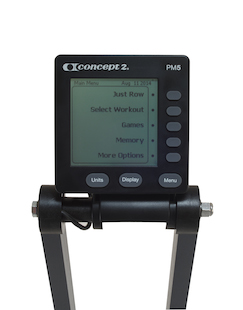
Every Dynamic RowErg includes our most advanced Performance Monitor, the PM5. The powerful PM5 provides repeatable, comparable data for every ride. The PM5 offers automatic “Just Row” mode, or allows you to set up a variety of workouts. The monitor gives you a wide range of data, including pace, watts, stroke rate (spm) and Calories and automatically stores this information in either its internal memory or an optional USB flash drive. The PM5 uses power from 2 D-cell batteries whenever it is not being powered by the flywheel. The adjustable monitor arm on the Dynamic lets you position the monitor where you prefer.
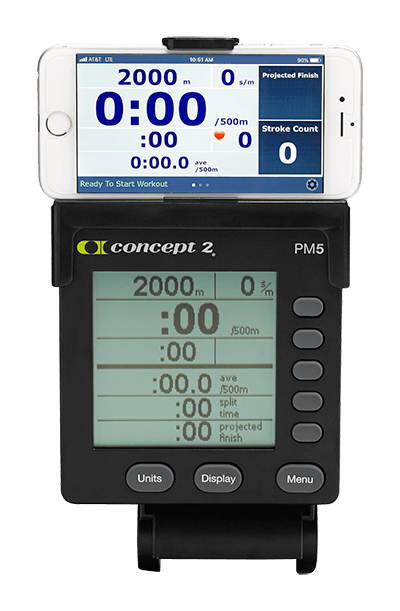 Connect to ErgData with your PM5
Connect to ErgData with your PM5
The PM5 monitor has both Bluetooth and ANT+ wireless connectivity, allowing it to connect to many heart rate belts, fitness devices and apps. The free Concept2 ErgData app helps you track your workouts and can sync with the Concept2 Online Logbook. Third party apps can provide additional features to help keep you motivated.
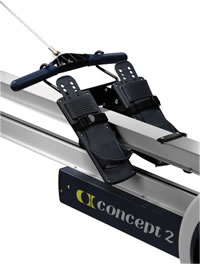
The footrest is free to move back and forth on the monorail. A drive cord connects the foot carriage to the handle and transmits the combined leg and upper body force to the flywheel. The Dynamic encourages body control, early body preparation and good “connection” between the oar handle and footrest during the drive.
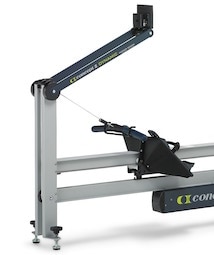
The drive system of the Dynamic uses a high-tech, high-strength synthetic cord. The cord’s light weight results in a system that is more responsive to the rower’s movements and quick to react, especially at high stroke rates.
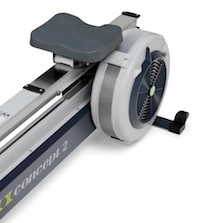
The Dynamic responds to your effort on every stroke, so you are in full control of your exertion and resistance at all times. The spiral damper allows you to quickly adjust the airflow to the flywheel, so you can change the feel of the stroke to suit your preference, easily moving between feeling like you’re in an eight or a single or adjusting to a slower “heavier” drive movement.
The Dynamic must be stored fully assembled, but with a small 76 in (193 cm) footprint when compared to a Model D or E on Slides (132 in/335 cm), you’ll be able to get more Dynamics in your boathouse.
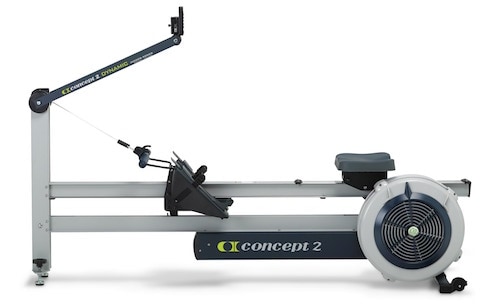
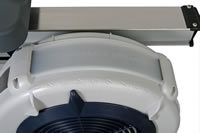
All Concept2 Dynamic RowErgs ship with an optional Wind Shield. The clear plastic Wind Shield is located on the top of the flywheel and deflects air from the flywheel away from the rower’s body. Athletes who prefer the additional breeze can easily slip the Wind Shield off.
Our machines are well-known for their durability and construction. Tough and built to last, our machines withstand rigorous use in boathouses, training centers, living rooms, hotels, health clubs and military bases around the world. We make sure our machines are easy to care for so you can focus on using your investment, not maintaining it.
You can use the Dynamic Link (sold separately) to connect two or more Dynamics together for team training. Using the Link you can easily row with a partner, set up an entire 8+, or anything in between.
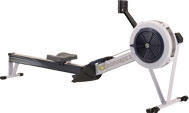
|

|
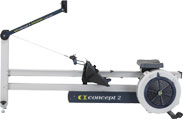
|
|
| Dynamic | |||
| Overall Length |
76 in (193 cm) |
||
|---|---|---|---|
| Width |
24.3 in (62 cm) |
||
| Seat Height |
21.5 in (55 cm) |
||
| Monorail Length |
Fits inseams up to 40 inches |
||
| Chain or Cord | High strength synthetic drive cord | ||
| Chain/Cord Housing | Partially enclosed | ||
| Monitor |
PM5 |
||
| Power Requirement | Takes two D cell batteries. During your workout, the monitor draws power from the spinning flywheel to extend battery life. | ||
| Maximum User Weight |
500 lb (227 kg) |
||
| Construction |
Welded steel |
||
| Monitor Arm | Aluminum. Pivots for storage and to adjust monitor height. Monitor angle can also be adjusted. | ||
| Finish |
Powder coat |
||
| Color Scheme |
Light grey with dark blue-grey accents. |
||
| Storage |
Must be stored in its fully assembled state |
||
| Space Recommendations |
Assembled: 6.3 ft x 2 ft (193 cm x 62 cm) |
||
| Machine Weight |
92 lb (42 kg) |
||
| Shipping Dimensions |
Two boxes: |
||
| Shipping Weight |
Box 1: 57 lb (26 kg) |
The Dynamic RowErg more closely simulates the physics experienced while rowing a racing shell and the "dynamics" between the boat and athlete. On the dynamic erg, a user's body mass is relatively stationary while components of the machine actively move in response to the rowing motion, similar to the way a lightweight rowing shell moves around the rower's body.
The functional difference between the Dynamic and the Model D or E is that as you row, your footrests do most of the moving rather than the seat. The seat is also free to move, but due to the physics of rowing, the seat movement is minimal.
The Dynamic encourages body control, early body preparation and good “connection” between the oar handle and footrests during the drive. On the Dynamic, body mass movement is minimized during the stroke cycle, while on a Model D or E, total body mass moves back and forth during the stroke cycle.
The design of the Dynamic RowErg has allowed us to reduce the handle return tension significantly compared to our Model D and E. Handle return tension, inherent in erg rowing, is not something experienced in the boat, so we view this lower tension as a positive feature. The tension is set low when we ship the Dynamic RowErg, and we suggest rowing with it like this for a while before choosing to tighten the bungee if you really want it to feel “more like an erg.”
Both the Dynamic RowErg and the RowErg on Slides attempt to mimic boat dynamics. The Dynamic offers a feeling of rowing in a lightweight shell, because only the foot carriage is moving. This is consistent with the footrests fixed within a boat, where the boat is surging with each stroke relative to the water. The Model D on Slides is more like rowing in a heavy boat, due to the movement of the entire mass of the machine. Both the Slides and the Dynamic (when used with the Dynamic Link) allow you to connect multiple ergs for rowing as a team.
For general fitness, the Concept2 RowErg may be a better choice, since it provides an efficient workout for all abilities. The RowErg is our most affordable option for those looking for a rowing workout.
Athletes who are looking for a more specific technical approach should consider the Dynamic. It encourages the rower to use the same precise coordination, connection and power application required to achieve maximum speed in a racing boat. The Model D is currently still the standard for rowers who are training for indoor rowing competitions, attempting world records, or submitting scores for recruiting.
You should understand the differences between our RowErgs before considering the Dynamic only because of its size. In use, the Dynamic has a smaller footprint, (76 inches/193 cm) than either a RowErg (96 inches/244 cm) or a RowErg on Slides (132 inches/335 cm). However, the RowErg can be quickly separated into two compact pieces for moving and storage. All models include caster wheels to make moving them easy. The Dynamic, however, does not separate for storage and the assembled unit weighs 92 pounds (42 kg); it works best in a dedicated location. It is important to understand the function of the Dynamic before choosing it on the basis of its footprint.
The RowErg is engineered to be our quietest machines. The complexity of the Dynamic’s action involves more moving parts. These moving parts generate more sound.
There are no tests that can claim that the Dynamic is better for backs, knees, or other injuries; however, there are important differences between traditional ergs and the Dynamic that may address the source of problems for some people. On a static erg, body weight moves back and forth, changing the direction of that moving mass (the body) every stroke with the back, core muscles and hamstrings. Perhaps the more significant difference is that the Dynamic promotes rowing at a higher stroke rate than when rowing on the RowErg, more similar to an on-water stroke rating.
It is commonly understood that intense rowing at low stroke ratings results in high force per stroke, which is transmitted through the rower's body. Higher stroke ratings on the Dynamic result in a lower force per stroke for the same level of power output.
On the Dynamic RowErg, the flywheel is located near the athlete, providing some airflow from below while you row. All Concept2 Dynamic RowErgs now ship with an optional Wind Shield. The clear plastic Wind Shield is located on the top of the flywheel and designed to deflect air coming from the flywheel away from the rower’s body. Athletes who prefer the additional breeze can easily slip the Wind Shield off.
Using the Wind Shield will slightly reduce the drag factor at the current setting. The flywheel damper may be adjusted as needed to maintain the desired feel. Learn more about damper setting and drag factor on the Damper Setting 101 page.
Customers who purchased a Dynamic RowErg prior to the Wind Shield’s release may call customer service for details on obtaining this accessory as a retrofit. The Wind Shield is also available as a replacement part.
The drive system of the Dynamic RowErg uses a high-tech, high-strength synthetic cord. The cord's light weight results in a system that is more responsive to the rower's movements and reacts more quickly, especially at high stroke rates. Using a cord instead of a heavier chain makes a lighter handle return force possible, which is more similar to the feel of rowing in a boat.
The synthetic cord is three-and-a-half times stronger than the RowErg chain, and is used for sailboat rigging, commercial fishing nets, industrial lifts and slings, and even trapeze support ropes. However, monitoring the cord is an essential part of routine maintenance. Owners of Dynamic RowErgs should inspect the cord regularly for visible signs of wear. The cord may become fuzzy, but does not need replacing until the fibers begin to separate.
There are dynamic and mechanical differences that work both in favor of and against each type of RowErg. Times may vary slightly depending on the individual. We are finding that there is a learning curve, and as individuals spend more time on the Dynamic, their times become more similar to what they expect on the RowErg.
There are no planned changes for the World Rowing Indoor Championships. Race directors make individual decisions on what events to include in their races, so some indoor races may incorporate the Dynamic RowErg at their discretion.